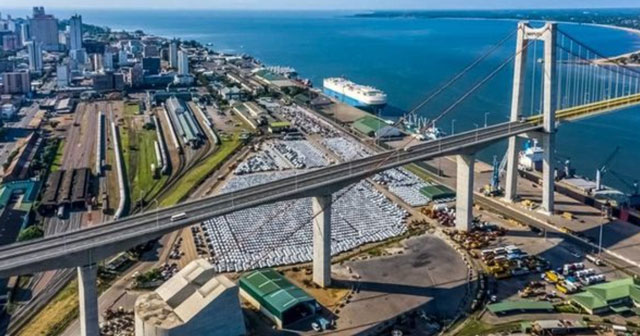
Privatised 20 years ago, the Maputo Port’s success offers a model for African ports seeking efficiency and growth, with growth likely to continue, according to investors.
SPECIAL REPORT | BIRD AGENCY | Two decades after Mozambique privatised its only international harbour, the Port of Maputo is recording remarkable progress, both in terms of the volume of goods it handles and the dividends it delivers to its shareholders, according to one its shareholders.
“Maputo port reported an increase of 30% on prior period volumes” Grindrod Limited, a South African ports, terminals, and logistics operator, said in an August 25 statement on its interim financial report for the six months ending in June 2023. Grindrod pointed to further growth thanks to expanded capacity.
“Two mobile harbour cranes at a cost of ZAR 392 million (at 100% shareholding) were delivered and commissioned during the period, adding to the port’s berth handling capacity in anticipation of the expected increase in demand for the export allocation” the report added.
In 2022, the port handled almost 27 million ton, a significant increase from the 5 million tons it handled in 2007.
While the Mozambique government remains responsible for the administration of the harbour, the concession for operations is held by a public-private joint venture, the Maputo Port Development Company, a partnership between Mozambique Ports and Railways, Dubai-based DP World, and Grindrod.
The surge in volumes during the first half of 2023 follows a successful 2022 with cargo volumes rising by 4.4 million tonnes to reach a record 26.7 million tonnes.
Grindrod attributes the record growth to substantial investment of more than US$800 million in port operations following its privatisation. The addition of the cranes, at a cost of more than US$21 million (ZAR 392 million) is likely to result in continued volume growth during the year.
“In the recent five-year period, we have invested US $200 million… It took patience as a private sector investor and trust from the Mozambican government in the private sector,” Xolani Mambo, the CEO of Grindrod Ltd, highlighted in an interview with engineeringnews.co.za.
Strategically located near South Africa’s industrial heartland, Maputo Port is thriving at a time when South Africa’s ports and other freight systems face major challenges.
A study conducted in 2022 by Conningarth Economists in partnership with Standard Bank estimated that the modernisation and expansion of the Port of Maputo could potentially contribute around US$345 million annually to Mozambique’s gross domestic product (GDP) until 2058.
This is in addition to projected income from taxes and increased economic activity in the country from the expanded operations, with the entire value chain is anticipated to contribute an average of US$1.2 billion annually to both Mozambican and South African GDP, the report stated.
A wave of privatisation is impacting ports around the continent, as African countries look to enhance the efficiency of their supply chains.
The most recent example is South Africa’s largest container port facility, Durban’s Container Terminal Pier 2. The facility has been privatised through a public private partnership deal involving South Africa’s Transnet and International Container Terminal Services, a Philippines-based ports operator.
Similar developments are planned for more South African ports, while ports in Kenya, Tanzania, Senegal, Nigeria, Madagascar, the DRC, and Cameroon are also undergoing privatisation, a trend that is gaining momentum.
Denrick Moos, an expert in container terminals and former CEO of Nigeria’s Lekki Freeport Terminal, outlined the numerous positive outcomes expected from privatisation.
In an opinion piece on moneyweb.co.za, he explained that the privatisation of ports generally leads to improved port performance.
“The most significant anticipated impact over the 25-year concession period is enhanced terminal productivity,” he said, referring to the Durban Port privatisation.
“Among the anticipated improvements is a more efficient e-commerce platform for container booking services, payments, and receipts, thus minimising delays associated with manual interactions,” he explained.
*****
SOURCE: bird story agency
 The Independent Uganda: You get the Truth we Pay the Price
The Independent Uganda: You get the Truth we Pay the Price



